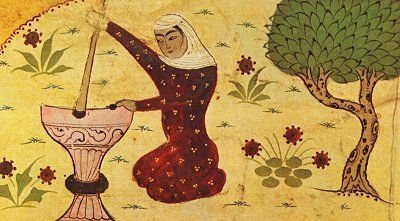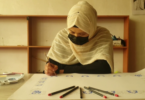Sultan Adanır
‘O Lord, if I worship you out of fear of hell, burn me in hell; If I worship you in the hope of paradise, forbid it to me; If I worship you for your own sake, do not deprive me of your everlasting beauty’
When a wayfarer sets out on a journey, what does she expect to attain? Novices are warned against any expectation as the expectation means demand and Sufism means letting go of demands. It is not that hard to abandon worldly desires if one’s mind is fixed on a higher demand.
However, what is the difference between worldly desires and heavenly desires? The former is temporary, unreliable, and thus despised, while the latter is eternal, trusty, and thus praised. The equation is simple in terms of Sufism: When one abstains from the first, she attains the second. However, one figure drew our eyes toward the Creator rather than Allah’s creations. Rabia of Basra, also known as Rabiʿa al-ʿAdawiyya al-Qaysiyya, Hazrat Rabia Basri, Rabia Al Basri or simply Rabia Basri, the first and foremost female Sufi, loved Allah so much that everything is erased from her eyes. Hers became an inspiration for love-centered worship.
One cannot help but notice that a woman created a name for her love. Is it because that women are more emotional than men? Did she canalize all her feminine nature toward her religiosity that her religious understanding was formed around loving nothing but Allah? While her contemporaries were known for their asceticism and devotion and she lived just like them, she stood out for her love but we cannot associate this with her gender. Gender is also erased from a person when she achieves unity with Allah. This unity means being a complete vassal in front of Allah with no title left such as a mother or a scholar or with no attachment to another being such as a property or fame. Rabia describes this unity as such: “In unity, how can the existence of ‘me’ and ‘you’ remain, much less ‘man’ and ‘woman’?”
When a person loses all her attachments and titles, what is left of her? In her case, Rabia was left with nothing but her love for Allah. She was so captured by Allah’s love that she became blind to her surroundings which can be a definition of real love: Seeing nothing but the loved one. It is narrated by Farid-ud Din Attar that in the springtime she would not come out of her house. When invited to go outside to gaze at the beautiful effects of the creation blooming with the coming of spring, she said: “You come in for once and see the Creator! Witnessing the Creator has kept me from gazing at the creation.” She was witnessing the real beauty that is the Creator of beauty and what worth does it have in the face of its Creator?
A similar yet very controversial story is also related to her. It is a mythical story in which Kaaba set foot to welcome her on her way to Mecca and she said: “I need the Lord of the house. What am I to do with the house?” What makes Kaaba holy is that Allah assigns it this power and she says that power means nothing to her. The One who assigns is worshiped in Hajj, not Kaaba. Rabia reminds us of Allah’s promise in this story: “Whoever approaches Me by a hand’s span, I will approach by an arm’s span.” And if a person is traveling to Mecca to approach Allah, he/she is expected to look for Allah instead of Kaaba. Her perspective directs our attention toward the meaning hidden behind the objects. Ibn Arabi insists upon the fact that this universe is a veil. It is a veil covering the Real, the Creator, and All-Beautiful. Or it is a veil preventing us from seeing Him, distracting us in worthless affairs. Either way, it becomes a hindrance between the created and the Creator and lover and the Loved.
We have mentioned that it is controversial because she and some Sufis of the same mind were harshly criticized by scholars of the external sciences for underestimating Islamic law. However, it is not a belittlement of the law, if there was a belittlement, it would be of “anything except God.” This is such an exceptional state of mind that everything loses its charm compared to the loved one. And it is such an unconditional love that the heart desires nothing but the Loved.
If Rabia had the power to destroy paradise or put out the fires of hell, she would. She was not worshiping Allah out of fear of hell or for the hope of heaven. She was doing it for Allah’s sake only. Because the lover is the one who gives up expectations otherwise the expected would be the real loved one. The expectation is a hindrance between the worshipper and the Worshipped. If a person’s aim in worshipping is to attain heaven or to escape hell, the act of worship turns into a trade. However, one must worship just because Allah orders it and Allah makes it a way of approaching. If the loved one asks for something, a real lover would do anything to fulfill it.
Rabia, with a love outgrowing and transcending her, understood well that real love requires complete renunciation of expectation. She chose to close her physical eyes to things, beautiful or ugly so that her inner eyes could see the reality. That is why she must have said: “If I did not see, I would not worship” when she was asked if she saw the one she worshipped. She may be the only woman narrated in most of the hagiographical collections, but her character is so comprehensive that she represents womanhood just by herself. Historically as well, the characteristics of most of the female Sufis were attributed to her so it is true that she means most female Sufis.
Courtesy: Dailysabah







